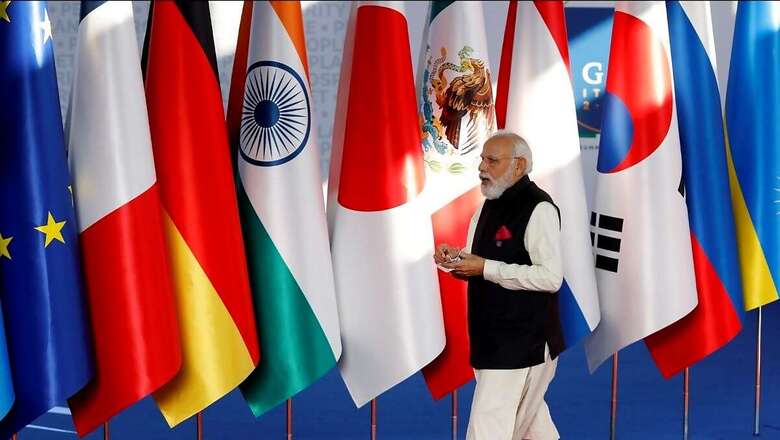
views
India’s emergence as a prominent global player has been a remarkable phenomenon in recent years. With its rapidly expanding economy, growing geopolitical influence, and rich cultural heritage, India has re-captured the attention of the world. As we witness this rise, it becomes imperative to reflect upon history and the shifts in the global order that have shaped nations and societies. The study of past transitions offers insight into what a more multipolar global order may look like and discern the challenges and opportunities it may present.
The ebb and flow of global affairs has always been punctuated by momentous shifts in the established order. The French Revolution, with its revolutionary ideals of liberty, equality, and fraternity, sent shockwaves across Europe, challenging the entrenched power structures. As Napoleon Bonaparte emerged as a formidable force, threatening to dominate the continent, a coalition of powers rallied against him. The ensuing defeat of Napoleon led to the convening of the Concert of Vienna in 1814, a diplomatic assembly aimed at restoring stability and establishing a new order in Europe. This post-revolutionary period witnessed a concerted effort to preserve the delicate balance of power among nations, ensuring a semblance of stability in the aftermath of revolutionary upheaval.
The 19th century witnessed the emergence of new players on the global stage which further disrupted the prevailing order. The United States, propelled by its rapid industrialisation, surged forward as an economic powerhouse, challenging the established European powers. Meanwhile, Germany and Japan, driven by their own ambitions, embarked on paths of aggressive expansion and imperial conquest. The resultant tensions and rivalries led to two devastating world wars that shook the foundations of the existing global order.
The aftermath of World War II witnessed the emergence of two superpowers, the United States and the Soviet Union, whose spheres of influence extended across the globe. The bipolar world order that ensued was characterised by a delicate balance of power, with each superpower vying for dominance in a global chess match. The Cold War rivalry between the two giants dictated global politics, as nations aligned themselves with one of the two ideological camps.
However, the dawn of the 1990s brought about a seismic shift in the global order. The collapse of the Soviet Union heralded the end of the bipolar era and ushered in what was perceived as America’s “unipolar moment.” With the United States standing as the sole superpower, it enjoyed unparalleled influence and authority in shaping global affairs. This unipolar world order, though marked by relative stability, was not devoid of challenges.
As the new millennium unfolded, the ascension of China began to reverberate across the international stage. With its unprecedented economic growth and expanding geopolitical influence, China emerged as a formidable contender to US dominance. Simultaneously, Russia, recovering from its post-Soviet economic turmoil, sought to regain its position as a global power player. These dynamics engendered a more multipolar world, characterised by a shifting power balance and the potential for new alignments and alliances.
In this landscape of evolving power dynamics, the rise of India assumes great significance. Endowed with a burgeoning population, a thriving economy, and an abundant tapestry of cultural traditions, India has the potential to reshape the global order. Its influence extends beyond the confines of the Indian subcontinent, with increasing forays into the realms of technology, diplomacy, and soft power projection. A strong India, with its democratic ideals and diverse cultural fabric, could add another layer of complexity to the global balance of power, potentially fostering a multipolar world that reflects a more equitable distribution of influence.
The implications of a rising India on the global order cannot be fully predicted or predetermined. It is a complex interplay of various factors, including domestic policies, international relations, economic growth, and societal dynamics. India’s journey towards greater prominence on the global stage is not without challenges and hurdles. Issues such as socioeconomic shifts, regional disparities, and governance reforms need to be addressed to ensure a stable and sustainable rise.
The global order is a dynamic and ever-evolving construct. It is influenced not only by the rise and fall of nations but also by technological advancements, ideological shifts, and the aspirations of individuals and communities. The future of the global order hinges on how these multifaceted elements interact and shape the world in the years to come.
Navigating this uncertain terrain requires a strategic and inclusive approach. Nations must foster dialogue, collaboration, and mutual understanding to forge a new global order that promotes peace, stability, and shared prosperity. This necessitates collective efforts to address common challenges such as climate change, the economic upsurge of Asia and Africa, and the preservation of human flourishing. It also requires acknowledging and respecting the unique cultural identities and aspirations of different nations and peoples.
The history of the global order has taught us that change is an inherent characteristic of the human condition. As nations rise and fall, alliances shift, and power is redistributed, it is imperative for policymakers and global actors to navigate these transitions with prudence and foresight. Cooperation, diplomacy, and a commitment to peaceful resolutions become paramount in preserving stability and fostering a more equitable world order. The rise of India, alongside the continued ascendancy of China and the resurgence of Russia, necessitates a delicate balance of power that upholds the principles of mutual respect, inclusivity, and collective security. The interplay of nations and their aspirations will determine the contours of the global order in the coming decades, with the potential for a multipolar framework that reflects the evolving dynamics of power.
India’s long history as a continuous civilisation, diverse society, and economic potential position it as a significant player in shaping the future global order. As India’s influence expands, it is essential to foster a cooperative and collaborative approach among nations to leverage the strengths and capabilities of diverse stakeholders. Accommodating India in the world order requires recognising its growing significance and providing it with a commensurate role in international institutions. In the context of the United Nations Security Council (UNSC), India’s inclusion as a permanent member would reflect its status as the world’s largest democracy and a major global player. Reforms within the World Trade Organisation (WTO) should aim to provide India with greater representation and ensure its concerns are addressed, given its substantial market size and economic influence. Similarly, in institutions like the World Bank and International Monetary Fund (IMF), India’s voice should be amplified to reflect its growing economic weight and development aspirations. By accommodating India in these global institutions, the world can harness its potential, foster equitable decision-making, and effectively address the challenges and opportunities of a rapidly changing global landscape. The rise of India holds promise, not just for India itself but also for the world at large.
The author is an accomplished data engineer and public markets investor with a deep understanding of the financial, IT, and energy sectors. He tweets @DeepakInsights. Views expressed are personal.



















Comments
0 comment